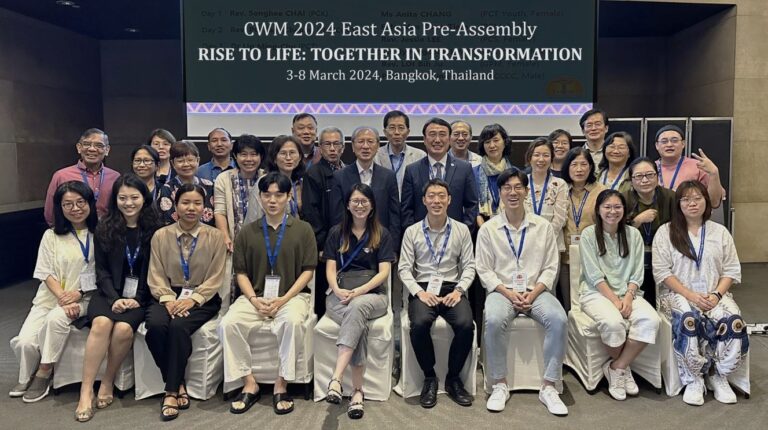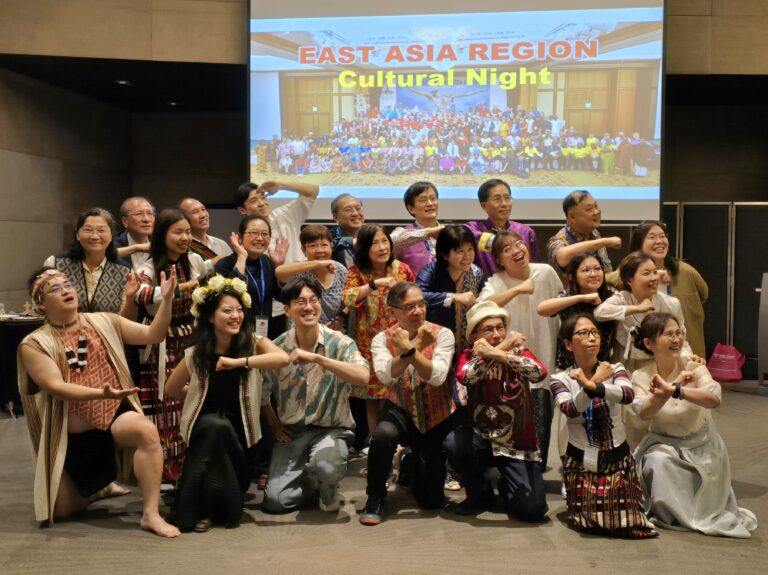
The Council for World Mission (CWM) East Asia Regional Pre-Assembly convened 3-8 March in Bangkok, Thailand, drawing 30 delegates including ordained ministers, laypersons, and women and youth representatives from the six CWM regional member churches—Gereja Presbyterian Malaysia, Hong Kong Council of the Church of Christ in China, Presbyterian Church of Korea, Presbyterian Church of Myanmar, Presbyterian Church in Singapore, and Presbyterian Church in Taiwan. The East Asia Pre-Assembly sought to celebrate the diverse gifts and contributions of regional member churches while deepening participants’ spiritual understanding and collective purpose through contextual Bible studies and thematic presentations. The event also prepared participants for the upcoming CWM Assembly in June by outlining its functions, expounding delegate roles, facilitating election processes, clarifying logistical details, and the sharing regional stories. Rev. Dr Jooseop Keum, CWM General Secretary, offered opening greetings, saying: “The global CWM Assembly will strive to foster life-flourishing communities where people can rise and find spaces of belonging and new hope together. We believe that the collective discernment and unity of God’s people has the power to transform the world.” Relooking at anthropocentric ecumenism In a keynote address, Rev. Dr Un Hey Kim, Professor at the Presbyterian University and Theological Seminary, Seoul, Republic of Korea, called for a radical shift in the global ecumenical movement towards a broader understanding inclusive of all life forms, as opposed to a church-centred approach. She argued that even in the face of a pandemic disaster, ecological issues have received only minimal attention from churches as neither them nor contemporary theology have paid enough attention to serious warnings about the destruction of the ecosystem. Kim posited that one of reasons for this is the misunderstanding of eschatological teachings that positioned the apocalypse as an anthropocentric event. Kim forwarded an alternative outlook that Christ and His work of salvation includes not only humans, but also irrational creatures, material creatures, living things, inanimate objects, organisms, inorganic land, sky, rivers, seas, nature, animals, and plants. “We need to reflect on the fact that the Western theological tradition has viewed human salvation as separate from the world and nature. Salvation does not mean the separation of man from the world and nature,” exposited Kim. She also added that it is utterly necessary to reflect on how God became a part of the earth by incarnating in an earthly body and becoming a member an earthly community. “Therefore, what we need is not just an eco-friendly ecumenism, but a symbiosis ecumenism, from which we treat every being on this planet as part of our extended family. “Paul wrote in Romans 8 that humans are not the only ones who wait anxiously for salvation; all creatures, the whole creation, living with humans wait for salvation ‘with eager longing.’ This is a testimony to the fact that they desperately want to be saved and to be God’s family together,” surmised Kim. A shift to a poly-centric mission In the exploration of the sub-theme of Revisioning Mission, Rev. Dr Tan Yak-hwee, an ordained minister with the Presbyterian Church in Singapore, presented on the evolution of mission, from unilateral and unidirectional approaches to current poly-centric and poly-directional ones. In the exploration of the sub-theme of Revisioning Mission, Rev. Dr Tan Yak-hwee, an ordained minister with the Presbyterian Church in Singapore, presented on the evolution of mission, from unilateral and unidirectional approaches to current poly-centric and poly-directional ones. Yak-hwee dissected the history of Christian mission which had roots that were predominantly Eurocentric, hailing from Western cultural hubs like Rome and Constantinople. However, the trend of Western-led forms of theological thinking and philosophy has undergone a paradigm shift in the last century with the explosion of Christianity in the non-western world and the corresponding shift of gravity of Christianity to the global south. This has had a profound effect on how Christian mission is being reshaped. “Increasingly, there is a growing sentiment that mission is to be seen as a partnership that engages with everyone, especially those at the margins,” highlighted Yak-hwee, who went on to illustrate the gradual rejection and decline of Western-led, “white-Protestant” missiological movements. She also drew a parallel to this model of missional partnerships to the works that have defined the identity of CWM over the past decades. “We look back to the historical formation of CWM in 1977 in Singapore when everyone could contribute and receive from each other as equals. CWM exists indeed as a global body to help in the resource-sharing for mission by the CWM partnership of churches,” said Yak-hwee, who termed modern mission as “poly-centric and poly-directional—from everyone to everywhere.” She also highlighted the significance of recognizing the intersectionality of key issues such as racism and patriarchy in carrying out mission work in today’s complex world. Summing up her point on how intertwined societal issues and struggles are, Yak-hwee offered the audience her take that Christian mission is an endeavour that not only seeks to cut through the vestiges of colonial privilege, power, and oppression but also one that carefully considers the intersections of different social challenges and to work towards solutions that address these multiple issues, often at once. To do so, Yak-hwee concluded, would require collective radical resilience and a faith-filled hope so that all life will be allowed to flourish. 
SOURCE>CWM |